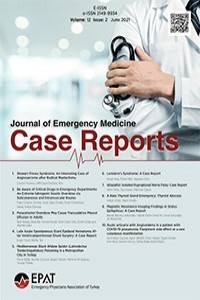Tocilizumab‑induced anaphylaxis in two patients with COVID‐19‐induced cytokine storm
anaphylaxis, COVID‐19, cytokine storm drug allergy, Tocilizumab,
___
- 1. Xu X, Han M, Li T, et al. Effective treatment of severe COVID-19 patients with tocilizumab. Proc Natl Acad Sci U S A. 2020 May 19;117(20):10970-10975. doi: 10.1073/pnas.2005615117. PubMed PMID: 32350134; PubMed Central PMCID: PMCPMC7245089.
- 2. Zu ZY, Jiang MD, Xu PP, et al. Coronavirus Disease 2019 (COVID-19): A Perspective from China. Radiology. 2020 Aug;296(2):E15-E25. doi: 10.1148/radiol.2020200490. PubMed PMID: 32083985; PubMed Central PMCID: PMCPMC7233368.
- 3. Qin C, Zhou L, Hu Z, et al. Dysregulation of Immune Response in Patients With Coronavirus 2019 (COVID-19) in Wuhan, China. Clin Infect Dis. 2020 Jul 28;71(15):762-768. doi: 10.1093/cid/ciaa248. PubMed PMID: 32161940; PubMed Central PMCID: PMCPMC7108125.
- 4. Salmon JH, Perotin JM, Morel J, et al. Serious infusion-related reaction after rituximab, abatacept and tocilizumab in rheumatoid arthritis: prospective registry data. Rheumatology (Oxford, England). 2018 Jan 1;57(1):134-139. doi: 10.1093/rheumatology/kex403. PubMed PMID: 29069471; eng.
- 5. Worm M, Eckermann O, Dolle S, et al. Triggers and treatment of anaphylaxis: an analysis of 4,000 cases from Germany, Austria and Switzerland. Dtsch Arztebl Int. 2014 May 23;111(21):367-75. doi: 10.3238/arztebl.2014.0367. PubMed PMID: 24939374; PubMed Central PMCID: PMCPMC4075276.
- 6. Park EH, Lee EY, Shin K, et al. Tocilizumab-induced anaphylaxis in patients with adult-onset Still's disease and systemic juvenile idiopathic arthritis: a case-based review. Rheumatology international. 2020 May;40(5):791-798. doi: 10.1007/s00296-019-04456-9. PubMed PMID: 31598752.
- 7. Salmon JH, Perotin JM, Morel J, et al. Serious infusion-related reaction after rituximab, abatacept and tocilizumab in rheumatoid arthritis: prospective registry data. Rheumatology (Oxford, England). 2018 Jan 1;57(1):134-139. doi: 10.1093/rheumatology/kex403. PubMed PMID: 29069471.
- 8. Tetu P, Hamelin A, Moguelet P, et al. Management of hypersensitivity reactions to Tocilizumab. Clin Exp Allergy. 2018 Jun;48(6):749-752. doi: 10.1111/cea.13142. PubMed PMID: 29603809.
- 9. Yasuoka R, Iwata N, Abe N, et al. Risk factors for hypersensitivity reactions to tocilizumab introduction in systemic juvenile idiopathic arthritis. Mod Rheumatol. 2019 Mar;29(2):324-327. doi: 10.1080/14397595.2018.1457490. PubMed PMID: 29578355.
- 10. Galvao VR, Castells MC. Hypersensitivity to biological agents-updated diagnosis, management, and treatment. J Allergy Clin Immunol Pract. 2015 Mar-Apr;3(2):175-85; quiz 186. doi: 10.1016/j.jaip.2014.12.006. PubMed PMID: 25754718.
- Yayın Aralığı: 4
- Başlangıç: 2010
- Yayıncı: Alpay Azap
EXTRACORPOREAL SHOCK-WAVE LITHOTRIPSY'S UNUSUAL COMPLICATION: RETROPERITONEAL GAS
Vefa ÇAKMAK, İbrahim TÜRKÇÜER, Mert ÖZEN
Her İstemsiz Hareket Epileptik midir?
Ramazan GURLU, Özlem Tolu KENDİR, Omerhan BASPİNAR, Nilgun ERKEK
Vefa ÇAKMAK, İbrahim TÜRKÇÜER, Mert ÖZEN
Kına Alımı Sonrası Parafenilendiamine Bağlı İntoksikasyon
Faızal Amrı HAMZAH, Mastura ONN
İlk Bakışta COVID-19, dikkatli bakınca Pulmoner Tüberküloz
Oğuz Abdullah UYAROĞLU, Nursel ÇALIK BAŞARAN, Lale ÖZIŞIK, Ahmet Cagkan INKAYA, Gülay Sain GÜVEN
